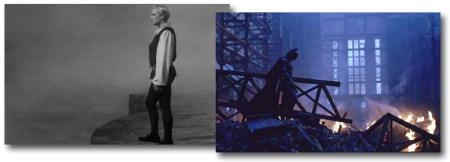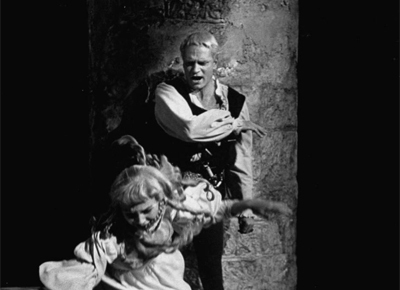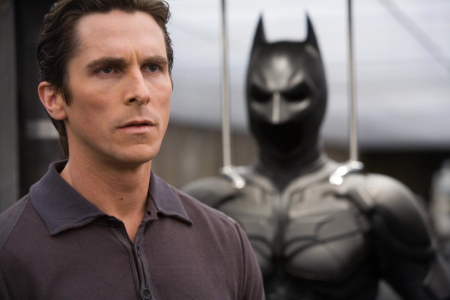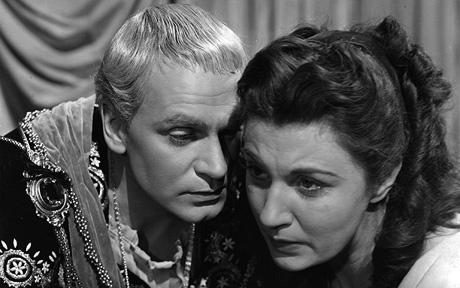Distant Relatives: Hamlet and The Dark Knight
 Thursday, March 17, 2011 at 5:20PM
Thursday, March 17, 2011 at 5:20PM Robert here, with my series Distant Relatives, where we look at two films, (one classic, one modern) related through a common theme and ask what their similarities and differences can tell us about the evolution of cinema.

The Laughing Fishmonger
Of course I’m not the first person to notice a similarity between Batman and Hamlet. While the Caped Crusader of Gotham officially owes more of his inception to Zorro, the themes of his story, the conflicts that keep us coming back owe much to Hamlet, if not directly than indirectly as a model of the same story of a man driven by the “virtue” of vengeance.
Outside the stories, as cultural institutions, these two tales have much in common. Both have inspired endless versions across multiple media. Both are told over and over and over again (demand for more is considerable). Both provide endless fodder for investigations into the human psyche. These two films are stories of heroes and villains that force us to wonder really: what is a hero?

Cape, cowl, tights, temper
We can start with the superficial similarities: two silver spooned children, dead parents, promises to seek retribution, manic dispositions put upon, villains everywhere, corrupt cops (if you’re so inclined to consider Rosencrantz and Guildenstern). There are similarities to be found everywhere if you wanted to stretch hard enough. You could find an equivalence between Hamlet’s third act travelling players ploy and the Gotham police department’s fake funeral plan. Two “shows” of reality meant to make the bad guy drop his guard.
But why the 1948 Laurence Olivier version and the 2008 Christopher Nolan interpretation? Olivier’s pared-down story lacks over-conceptualization or ornateness making it a good starting point, it’s almost the “control group” of Hamlets. More important to the comparison though is The Dark Knight, which kicks into high gear a concept hinted at by Batman Begins. That is to suggest that the super-villainy bubbling up is a direct result of Batman’s existence. Sure, other cinematic adaptations have played a bit with the “you made me” paradox but quickly dismissed it (suggesting The Joker killed young Bruce Wayne’s parents isn’t criminal because it rewrites Batman canon but it does whitewash the complexity of the character and underscore his hero status.) But Nolan is almost primarily interested in the ripple effect of Batman’s quest for justice and how like Hamlet’s vengeance it sends everything spiraling out of control.

"You've changed things... forever. There's no goin' back"
An equal and opposite reaction
What is the worst result, the highest tragedy of this downward spiral? The death of the innocent, most specifically the love interest of course. Ah, the love interest, Rachel Dawes and Ophelia, pushed away by our hero, caught up in the whirlwind of chaos he has created. The story needs a sacrifice and they’re it. And in both cases, their deaths propel us into another theme that Hamlet and The Dark Knight want to explore. The corrupting influence of grief sends both Harvey Dent and Laertes into the hands of evil just as easily as their tragedies propelled Bruce Wayne and Hamlet toward good... or should we say “good?” since all involved are feeding on their emotional instability to fuel their hunt for those who they consider responsible. The line between good and evil depends entirely on your perception of the big picture (and whether you see something more forgivable about an unjust death in the pursuit of justice than one in the pursuit of power.)
This is probably why the Hamlet and the Batman tales have such staying power. Because these questions have plagued humankind through centuries of the war, terrorism, crime, punishment, and the pursuit of justice. Yet neither of these films intend to give us moralized answers. There are no Gandhi lessons about an eye for an eye leaving the world blind here. Sure, we can see the results for ourselves, but our heroes are still meant to be heroes. What’s the last thing said about Hamlet? He’s called a “noble prince.” The last thing said of Batman? He’s called “the hero Gotham deserves.”

Hamlet would have illegally wire tapped all of Denmark's phones if he'd had the technology
There are, of course, differences between the two as well. Batman has more explosions. Batman has cooler villains more intent on anarchy (although Claudius’ apathy toward the Fortinbras threat isn’t exactly the model for great leadership). What Hamlet has, that Batman does not is doubt, at least according to Olivier who pegs his protagonist's problem as constant waffling declaring upfront that “This is the tragedy of a man who could not make up his mind.” Batman has no such qualms. Perhaps that’s the power that makes him a superhero, his superhuman determination that what he’s doing is unquestionably right. In that sense maybe Hamlet holds the moral high ground. Then again later interpretations of the character, unbound by the Hayes Code were more singular in their bloody thoughts and Hamlet himself is still directly responsible for several deaths while Batman has a code against killing, and so the pendulum swings back the other way.
Perhaps the one thing we can take from the comparison is that the audiences of 2008 just like the audiences of 1948 or 1600 for that matter really are looking for a complex hero, an honest story, and a good fight at the finale.



Reader Comments (6)
Great post Robert! I personally never made the comparison between The Dark Knight and Hamlet, and I love both movies, so this was enlightening. If anything, it really shows how great of a writer Shakespeare was that his works have been adapted in thousands of different ways over the last 500ish years.
love the finale of the post. it really boils down to the simple formulas in some ways as long as they're expertly accessorized ;)
For the ´good?˝ part. Batman question´s himself, If the things that he does are right or wrong. The publick opinion(of gotham) is against him, well the majority is, but there are still some who believe in the Bat. We, who watch the movies or read the comic books know that he is GOOD caracter. For the part that ˝he is the hero that Gotham deserves˝...Alfred say´s: ˝perhaps he is not a hero, perhaps he is something more˝ and Gordon say´s: ˝he is not hero...he is THE DARK KNIGHT!˝ ...nice post, I am with the Bat on this one, becouse he is the greatest super hero there is, or should I say, becouse he is THE DARK NIGHT ;)))
I read recently that Christian Bale kind of regretted deciding against going to one of the prestigious British theatre schools. I wish he had. It seems such a waste that all that intensity so rarely has a proper channel. One thing about those classic and Shakespearean parts is that they demand more than intensity, energy, or surface style. There's layers to them. I think Bale would have benefited as an actor to be able to regularly work with layered and demanding parts.
I think you make an excellent point about Batman being less self-reflective than Hamlet. Hamlet has many moods, including lightness, enthusiasm, and wit. Batman, not so much.
Although I have to admit, I've never found Batman interesting in any of his incarnations, although I think Bale is the best. Of the comic books I read as a kid, I liked Thor best of the guys. So Kenneth Branagh, one of the Hamlets, making Thor, does arouse my interest a bit.
It's so nice to have you do all of the research for us. It makes our decision making so much easier!! Thanks. drptck drptck - Belstaff Jackets.
Christmas is probably the most special day of the year for children. One thing that makes it special is the popular tradition of Santa Claus. uolulh uolulh - mulberry bags sale.